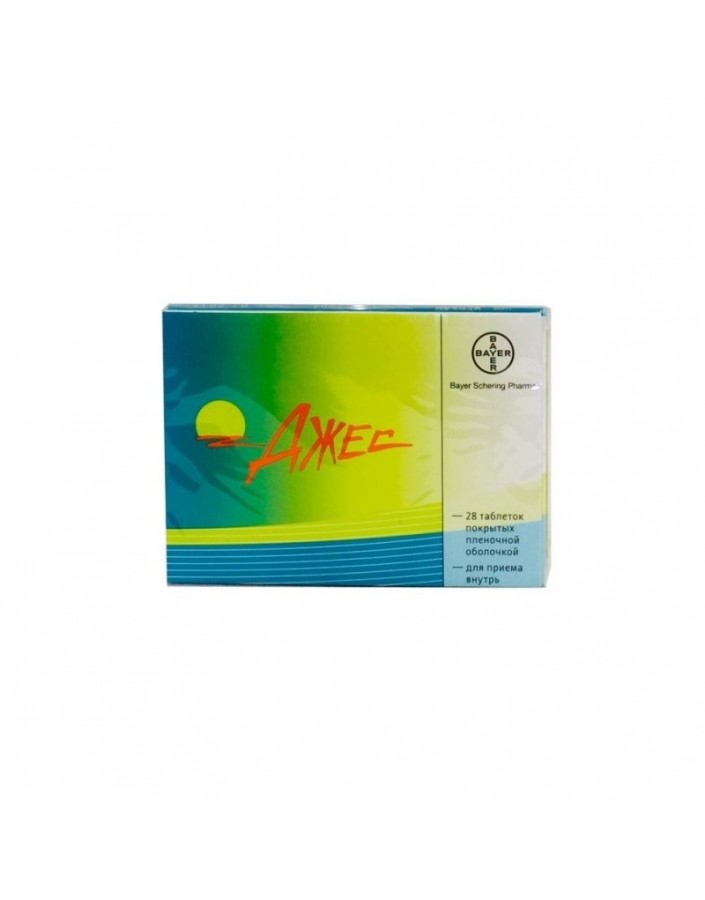




Security policy (edit with Customer reassurance module)

Delivery policy (edit with Customer reassurance module)

Return policy (edit with Customer reassurance module)
Film-coated active tablets:
1 pill contains ethinylestradiol 20 mcg, drospirenone 3 mg;
auxiliary thingsTwa: lactose monohydrate; corn starch; Magnesium stearate; hypromellose (hydroxypropylmethylcellulose); talc (magnesium hydrosilicate); titanium dioxide (E171); iron (III) oxide (E172)
Film-coated placebo tablet:
lactose monohydrate; corn starch; magnesium stearate; Povidone; hypromellose (hydroxypropylmethylcellulose); talc (magnesium hydrosilicate); titanium dioxide (E171);
in a blister 28 pcs. (24 active pills and 4 tablets. Placebo); in 1 or 3 cardboard folding books, 1 blister each.
Jess is a monophasic oral contraceptive with anti-mineralocorticoid and anti-androgenic properties.
Contraception; treatment of moderate acne (acne vulgaris); treatment of severe premenstrual syndrome (PMS).
Jess should not be used in the presence of any of the conditions listed below. If any of these conditions develop for the first time while receiving, the drug should be immediately canceled: thrombosis (venous and arterial) and thromboembolism now or in history (including deep vein thrombosis, pulmonary thromboembolism, myocardial infarction) cerebrovascular disorders; conditions preceding thrombosis (includingtransient ischemic attacks, angina) currently or in history; migraine with focal neurological symptoms now or in history; diabetes with vascular complications; multiple or pronounced risk factors of venous or arterial thrombosis, including damage to the valvular apparatus of the heart, cardiac arrhythmias, diseases of cerebral vessels or coronary arteries; uncontrolled arterial hypertension; pancreatitis with severe hypertriglyceridemia now or in history; liver failure and severe liver disease (before normalization of liver tests); liver tumors (benign or malignant) now or in history; severe renal failure, acute renal failure; identified hormone-dependent malignant diseases (including genitals or mammary glands) or suspicion of them; vaginal bleeding of unknown origin; pregnancy or suspicion of it; breastfeeding period; Hypersensitivity to any of the components of the drug Jess.
Inside, in the order indicated on the packaging, every day at about the same time, with a small amount of water. pills are taken without interruption in the reception. You should take one pill per day, sequentially, for 28 days. Each subsequent package should begin the day after taking the last pill from the previous package.
Withdrawal bleeding usually starts on the 2nd to 3rd day after starting inactive pills and may not finish before the next pack begins.
How to start taking Jess
In the absence of taking any hormonal contraceptives in the previous month, Reception Jess begins on the first day of the menstrual cycle (that is, on the first day of the menstrual bleeding). It is allowed to start taking on the 2–5th day of the menstrual cycle, but in this case it is recommended to additionally use a barrier method of contraception during the first 7 days of taking the pills from the first package.
When switching from other combined oral contraceptives, a vaginal ring or a contraceptive patch. It is preferable to start taking Jess the next day after taking the last active pill from the previous package, but in no case no later than the next day after the usual 7-day break (for drugs containing 21 tablets) or after taking the last inactive pill (for drugs containing 28 pills per pack). Reception Jess should be started on the day the vaginal ring or patch is removed, but no later than the day when a new ring is to be inserted or a new patch is pasted.
When switching from contraceptives containing only gestagens (“mini-pili”, injection forms, implant), or from a progestogen-releasing intrauterine contraceptive (Mirena) A woman can switch from “mini-pili” to Jess any day (without a break), from an implant or an intrauterine contraceptive with a progestogen — on the day of its removal, from an injection contraceptive — on the day when the next injection should be made.In all cases, you must use an additional barrier method of contraception during the first 7 days of taking pills.
When taking combined oral contraceptives, irregular bleeding (spotting or breakthrough bleeding) may occur, especially during the first months of use.
Against the background of taking combined oral contraceptives, women also had other undesirable effects, the connection of which with the use of drugs has not been confirmed, but it has not been refuted.
Gastrointestinal: often - nausea, abdominal pain; infrequently - vomiting, diarrhea.
From the side of the central nervous system: often - asthenic syndrome, headache, decrease in mood, mood swings, nervousness; infrequently - migraine, decreased libido; rarely an increase in libido.
Special senses: rarely, intolerance to contact lenses (discomfort when wearing them).
From the reproductive system: often - pain in the mammary glands, engorgement of the mammary glands, irregular menstruation, vaginal candidiasis, uterine bleeding; infrequently - breast hypertrophy; rarely - vaginal discharge, discharge from the mammary glands.
From the skin and its appendages: often acne; infrequently - rash, urticaria; rarely, erythema nodosum, erythema multiforme.
Other: often - weight gain; infrequently - fluid retention; rarely - weight loss, hypersensitivity reactions.
As with other combined oral contraceptives, in rare cases thrombosis and thromboembolism may occur.
In women with hereditary angioedema, estrogen administration may cause or exacerbate its symptoms.
Store in a cool and dark place, protected from light and moisture, at a temperature not higher than 25 ° C.
Jess